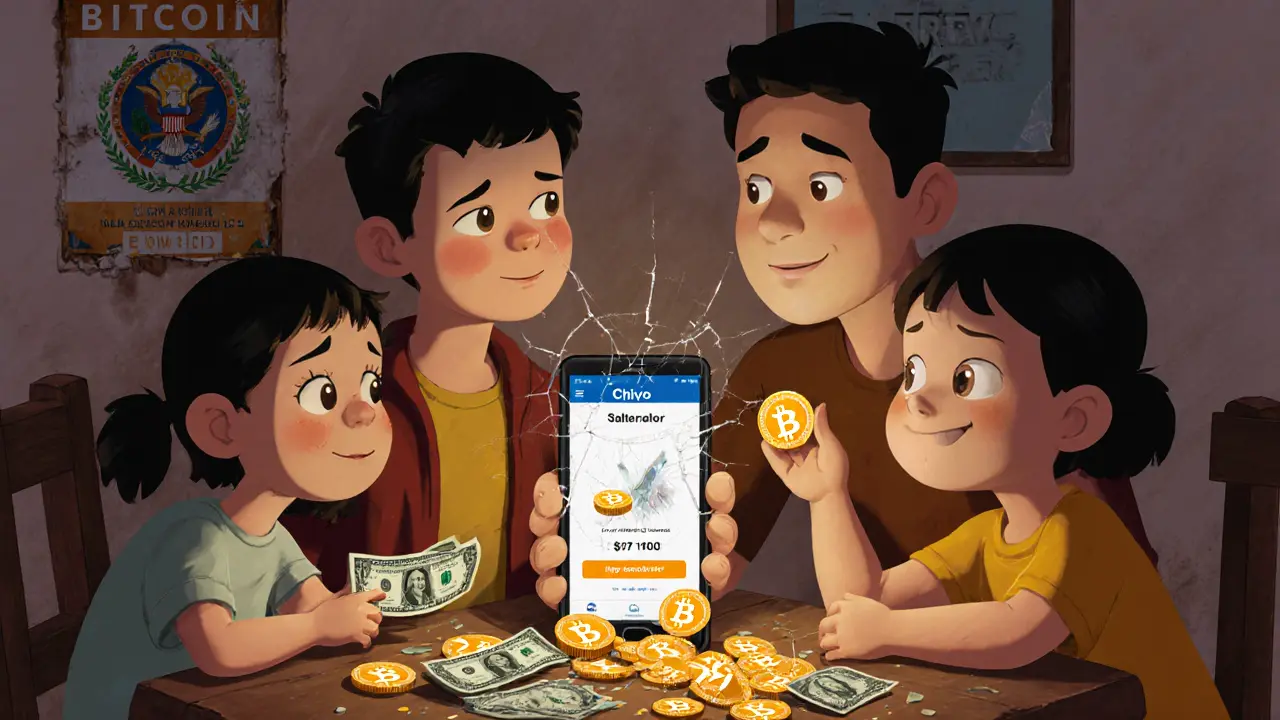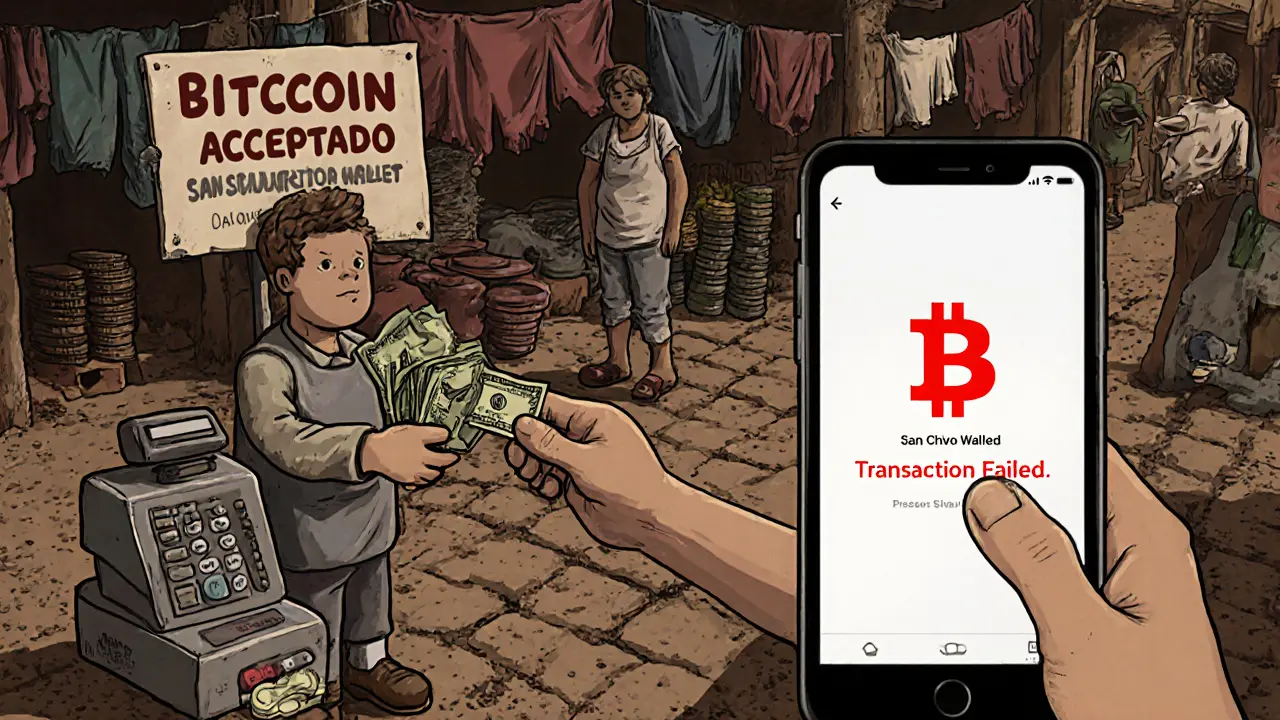Chivo Wallet and Bitcoin in El Salvador: What Went Wrong and What’s Left
 Sep, 24 2025
Sep, 24 2025
Chivo Remittance Fee Calculator
Calculate how much you could save when sending money to El Salvador with Chivo versus traditional services like Western Union. Based on data from the article: 10% average remittance fee for traditional services.
El Salvador made history in 2021 by becoming the first country to make Bitcoin legal tender. At the center of that move was the Chivo wallet - a government-backed app meant to let every Salvadoran send, receive, and spend Bitcoin without fees. It sounded revolutionary. But by early 2025, the experiment had changed dramatically. Bitcoin was no longer legal tender. The government stopped using Chivo for public payments. And most people stopped using it altogether.
Why Chivo Was Built
El Salvador’s economy runs on remittances. Nearly 20% of its GDP comes from money sent home by Salvadorans living abroad - mostly in the U.S. Sending that money through Western Union or MoneyGram cost, on average, 10% of the transfer. For families living paycheck to paycheck, that’s a huge cut. The government promised Chivo would fix that. No fees. No middlemen. Just Bitcoin, instantly, from anywhere in the world. The idea was simple: give every Salvadoran $30 in Bitcoin just for downloading the app. Make it easy. Make it free. Make it mandatory. By September 2021, the app was live. Within days, nearly half the country downloaded it. On paper, it looked like a massive success.How Chivo Actually Worked
Chivo wasn’t just a wallet. It was a dual-currency system. You could hold Bitcoin and U.S. dollars in the same app. When you paid for a taco, the app instantly converted your Bitcoin to dollars at the point of sale. Merchants got paid in dollars. You sent Bitcoin. The government handled the conversion. No one had to understand blockchain. Or volatility. Or private keys. It was built by AlphaPoint, a U.S.-based firm with experience in crypto infrastructure. The backend was designed to handle millions of users. But real-world use didn’t match the plan. The app crashed. Transactions failed. People lost money. Identity theft cases spiked. Some users reported their $30 bonus disappeared before they even opened the app. The biggest problem? Most Salvadorans didn’t trust Bitcoin. They didn’t understand it. And they didn’t want to risk their hard-earned money on something that could lose 50% of its value in a week. In 2022, Bitcoin dropped from $69,000 to $16,000. People who received $30 worth of Bitcoin saw it drop to $7. That wasn’t a bonus. It was a loss.The Adoption Gap
Download numbers looked good. Usage numbers didn’t. By 2024, a government survey found that 8 out of 10 Salvadorans never used Bitcoin for daily purchases. The $30 incentive got them to install the app. It didn’t get them to use it. People used Chivo mostly to cash out their $30 and then deleted it. Others used it once to receive a remittance - and then went back to cash or traditional apps. Why? Because the system didn’t solve their real problems. They needed stable money. Reliable service. Not a gamble. When the app went down for hours, they couldn’t pay their bills. When Bitcoin crashed, their savings vanished. And when they tried to explain Bitcoin to their parents or grandparents, they hit a wall. The government ran training sessions in villages. Posted videos on TV. Sent SMS reminders. But digital literacy in rural areas remained low. Many didn’t own smartphones. Others had old models that couldn’t run the app. Internet access was spotty. Chivo was designed for a digital future - but El Salvador still lived in a cash economy.
What Broke the System
The Chivo wallet wasn’t just a technical failure. It was a policy failure. The IMF stepped in. They had been watching. They saw a country exposing its entire economy to one of the most volatile assets on Earth. In early 2025, they made a deal: $1.4 billion in aid - but only if El Salvador dropped Bitcoin as legal tender. By January 2025, the law changed. Bitcoin was no longer required to be accepted by businesses. The government stopped using it for public payments. Chivo was no longer the official wallet of the state. The move didn’t kill Bitcoin in El Salvador. It just ended the mandate. The government still holds over 6,100 Bitcoin - worth around $500 million - as a strategic reserve. Private companies can still use it. Businesses can still accept it. But they don’t have to.What’s Left After the Fall
Chivo still exists. But it’s different now. The government no longer backs it. No more $30 bonuses. No more forced adoption. The app still works - if you have a smartphone and internet. You can still send Bitcoin. You can still convert to dollars. But the magic is gone. The real legacy of Chivo isn’t the wallet. It’s the infrastructure. El Salvador didn’t just launch an app. It built a digital payments system from scratch. It trained thousands of merchants. It created the National Commission of Digital Assets (CNAD) to regulate crypto. It passed the Digital Assets Issuance Act in 2023 - the first comprehensive crypto law in Latin America. Today, El Salvador hosts the biggest crypto conference in Central America. Startups are building on its open financial framework. Private wallets like Binance and Coinbase are gaining traction - not because the government forced them, but because people chose them.
Lessons Learned
Chivo’s story isn’t about Bitcoin failing. It’s about forcing change without understanding people. You can’t mandate trust. You can’t legislate adoption. You can’t solve poverty with a wallet. The real win? El Salvador proved a small country could lead the world in financial innovation. It showed that digital money can work - even if the rollout was messy. It forced the global financial system to pay attention. But the lesson for other countries? Don’t copy El Salvador’s method. Copy its ambition - but do it differently. Let people choose. Build tools that work in the real world. Don’t make Bitcoin the hero. Make financial freedom the goal.Where El Salvador Goes From Here
The government isn’t backing away from crypto. It’s just stepping back from coercion. Bitcoin reserves are still growing. The CNAD is approving new crypto projects. Private companies are launching stablecoin-based remittance services. Some are even testing CBDC pilots - central bank digital currencies - that won’t swing with Bitcoin’s price. The future isn’t about Chivo. It’s about choice. About competition. About building tools that fit real lives - not political slogans. For Salvadorans, the dream of cheap, fast remittances is still alive. But now, they’re getting there through apps that don’t crash. Through services that don’t gamble with their money. Through options they actually understand. Chivo was a bold experiment. It didn’t work the way they planned. But it didn’t fail. It evolved.Is the Chivo wallet still active in 2025?
Yes, the Chivo wallet is still active, but it no longer has government backing or special privileges. It functions as a regular Bitcoin and dollar wallet for those who still use it. The $30 incentive is gone, and businesses are no longer required to accept Bitcoin through it. Most users have moved to private wallets like Binance or Coinbase.
Why did El Salvador remove Bitcoin as legal tender?
El Salvador removed Bitcoin as legal tender in January 2025 after reaching a staff-level agreement with the International Monetary Fund (IMF) for a $1.4 billion financial aid package. The IMF raised concerns about financial stability, Bitcoin’s volatility, and risks to the country’s monetary system. The government agreed to stop using Bitcoin for public transactions and to phase out its role in the Chivo wallet.
Did the Chivo wallet help reduce remittance fees?
It helped - but only for a small group. Some Salvadorans who received remittances via Chivo saved money compared to Western Union. But most people didn’t use it for that. Many cashed out the Bitcoin immediately into dollars and stopped using the app. The overall impact on remittance costs was limited because adoption was low and volatility scared off users.
What happened to the $30 given to users?
The $30 was a one-time incentive to get people to download the app. Most users cashed it out within days. Some lost it due to app glitches or security breaches. Others saw its value drop as Bitcoin crashed in 2022. The government stopped offering the bonus in 2023, and the feature was removed from the app in 2024.
Is Bitcoin still used in El Salvador today?
Yes, but voluntarily. Businesses can still accept Bitcoin. Some do - especially in tourist areas and tech-savvy communities. Private crypto wallets are more popular than Chivo now. The government still holds over 6,100 Bitcoin as a reserve, and crypto startups are growing. But no one is forced to use it anymore.
What’s the difference between Chivo and other crypto wallets?
Chivo was the only government-issued crypto wallet in the world. It was designed to work with Bitcoin as legal tender, offered zero fees, and had a built-in dollar conversion system. Other wallets like Coinbase or Binance don’t have government backing, charge fees for some services, and don’t automatically convert Bitcoin to dollars at point-of-sale. Chivo was unique - but also fragile.
Did Chivo improve financial inclusion in El Salvador?
Not as much as promised. While 70% of Salvadorans were unbanked before Chivo, most didn’t become financially included by using Bitcoin. They still relied on cash, mobile money, or informal networks. True financial inclusion requires stable, reliable, and understandable tools - not volatile assets. The real progress came from better digital infrastructure, not from Bitcoin itself.
Can you still use Chivo to send money to the U.S.?
Technically, yes - if the recipient has a Bitcoin wallet. But most people in the U.S. don’t accept Bitcoin directly. So users still need to convert to dollars first, which adds steps and fees. Many now use apps like Wise or Remitly instead, which are cheaper, faster, and more reliable.
priyanka subbaraj
November 26, 2025 AT 04:16They gave people $30 in Bitcoin and expected them to become crypto evangelists? The real crime was assuming poor people want to gamble with their rent money.
Chivo wasn't a wallet-it was a con dressed up as progress.
Janice Jose
November 26, 2025 AT 10:32I get why people were skeptical. My cousin in El Salvador downloaded it for the $30, cashed out, and never opened it again. Honestly? I think the real win was forcing the government to finally invest in digital payments infrastructure-even if they picked the wrong asset.
At least now there’s something to build on.
Joel Christian
November 27, 2025 AT 19:08so like... bitcoin crashed and people lost money?? wow what a shock right??
maybe dont give free money in something that goes up and down??
also chivo app was a mess i heard
my friend tried to send cash via it and it took 3 days
lol
jeff aza
November 28, 2025 AT 04:20The structural flaws here are textbook: regulatory overreach + asset volatility + infrastructural underinvestment = inevitable collapse. The IMF’s intervention wasn’t punitive-it was actuarially necessary. Bitcoin’s 200%+ variance profile is incompatible with sovereign monetary policy, especially in economies with 70% unbanked populations and unreliable grid infrastructure.
Chivo was a Rube Goldberg machine built on sand. The only surprise? It lasted as long as it did.
Vijay Kumar
November 28, 2025 AT 07:46You can’t force enlightenment. You can’t legislate trust. You can’t turn peasants into blockchain priests with a $30 bonus.
El Salvador didn’t fail at Bitcoin-they failed at humanity.
Money isn’t about tech. It’s about dignity. And dignity doesn’t come from a wallet. It comes from stability.
Christina Oneviane
November 28, 2025 AT 14:10Oh wow, they gave people free Bitcoin and then acted shocked when people didn’t want to hold it?
Next time, try giving them free tacos instead. At least those don’t crash 80% in six months.
Also, who thought this was a good idea? The same people who thought ‘let’s put a volcano on the dollar’ was a fiscal strategy?
Susan Dugan
November 29, 2025 AT 15:40Let’s not throw the baby out with the bathwater. Chivo was a disaster as a currency experiment-but look at what it left behind.
Thousands of small merchants now have digital terminals. The National Commission of Digital Assets is actually doing work. People learned how to send money digitally-even if they used cash-out instead of hold.
El Salvador didn’t win the Bitcoin race. But they lit the starting gun for a whole new kind of financial race-one where people get to choose their own lane.
That’s worth more than any $30 bonus.
Grace Zelda
November 30, 2025 AT 18:01Wait-so the government forced people to use a wallet that crashed constantly, converted Bitcoin to USD without warning, and then blamed users for not trusting it?
And now we’re supposed to be impressed because they didn’t fully collapse?
Look, I love innovation-but this was like handing someone a jetpack and yelling ‘fly!’ while locking their feet in concrete.
Real financial inclusion means giving people tools that work *with* their lives-not forcing them to rewrite their entire existence to fit your ideology.
Chivo didn’t fail because Bitcoin is bad. It failed because the people running it didn’t understand the people they were trying to help.
SHIVA SHANKAR PAMUNDALAR
December 2, 2025 AT 04:29Bitcoin was never the problem. The problem was the illusion that technology alone can fix poverty.
Chivo was a political stunt wrapped in blockchain glitter.
Real change doesn’t come from apps. It comes from banks that don’t shut down. From electricity that doesn’t flicker. From schools that teach kids how to read, not how to HODL.
El Salvador didn’t lose Bitcoin.
They lost sight of what money is really for.